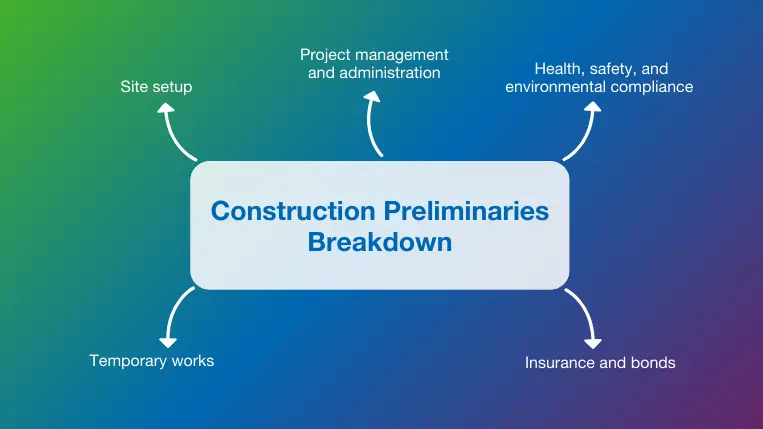Preliminaries in construction could silently drain your budget by up to 15% – here’s what every developer needs to know before breaking ground.
What Are Construction Preliminaries and Why They Matter
In the UK construction industry, preliminaries (often called ‘prelims’) represent a crucial yet frequently underestimated aspect of any building project. These costs, which typically account for 12-15% of total project costs, encompass all the essential activities and provisions required to facilitate smooth project execution but aren’t directly tied to physical construction work. Think of preliminaries as the behind-the-scenes infrastructure that enables your project to function effectively – from site offices and security to project management and temporary utilities. Recent industry data suggests that inadequate preliminary planning contributes to 23% of project delays and can lead to substantial budget overruns.
Essential Components of Construction Preliminaries
- Site Establishment: Temporary fencing, site offices, storage facilities, and welfare facilities
- Project Management: Site supervision, project coordination, quality control systems
- Temporary Services: Water, electricity, internet connectivity, and drainage systems
- Health and Safety Measures: PPE, first aid facilities, fire safety equipment
- Security Provisions: 24-hour security personnel, CCTV systems, access control
- Environmental Controls: Dust suppression, noise monitoring, waste management
- Insurance and Legal Requirements: Public liability insurance, employer’s liability insurance, permits
How Preliminaries Impact Your Construction Budget
The financial impact of preliminaries varies significantly based on project scope and duration. Fixed preliminary costs typically include one-off expenses like site setup and mobilisation, while time-related preliminaries encompass ongoing costs such as site supervision and temporary facilities. According to recent UK construction data, preliminary costs have increased by 8.5% in the past year due to rising insurance premiums and stricter health and safety requirements. Projects in urban areas generally face higher preliminary costs, with London-based projects often seeing preliminaries reaching up to 18% of total project value due to complex logistics and stringent local regulations.
Managing and Optimising Preliminary Costs
- Early Planning: Conduct thorough site surveys and risk assessments
- Value Engineering: Identify opportunities for shared resources and facilities
- Smart Scheduling: Optimise project duration to minimise time-related preliminaries
- Supplier Negotiations: Bundle services and seek long-term agreements for better rates
- Technology Integration: Utilise digital tools for efficient project management
Real-World Implications: Case Studies and Examples
Consider the recent £12 million commercial development in Manchester where careful preliminary planning saved £180,000 in preliminary costs. The project team achieved this by implementing a phased handover strategy, optimising site layout, and using modular site facilities. Conversely, a London residential project faced a 32% increase in preliminary costs due to inadequate planning of temporary works and underestimated security requirements. These real-world examples highlight the critical importance of thorough preliminary planning and management.
Making Informed Decisions About Preliminaries
Success in managing preliminaries requires a strategic approach tailored to your project’s specific requirements. Modern construction practices in the UK emphasise the importance of early contractor involvement (ECI) and detailed preliminary planning. The Construction Leadership Council reports that projects utilising ECI show average preliminary cost savings of 7-12%. Key considerations should include site location, project duration, local authority requirements, and supply chain logistics. Digital tools and Building Information Modelling (BIM) are increasingly being used to optimise preliminary planning, with 68% of UK contractors now using digital platforms for preliminary cost management.
Expert Tips for Cost-Effective Preliminary Management
- Risk Assessment: Conduct comprehensive site and project risk evaluations
- Supply Chain Integration: Engage early with suppliers and subcontractors
- Resource Optimisation: Plan for efficient use of site facilities and equipment
- Compliance Planning: Stay ahead of regulatory requirements and permits
- Regular Reviews: Monitor and adjust preliminary provisions throughout the project
Conclusion: Mastering Preliminary Costs for Project Success
Understanding and effectively managing preliminaries is crucial for successful project delivery in today’s challenging construction environment. With preliminary costs potentially impacting up to 15% of your budget, careful planning and strategic management are essential. Focus on early planning, regular monitoring, and leveraging modern technologies to optimise these costs. Remember that well-managed preliminaries not only control costs but also contribute to smoother project execution and improved site safety. For additional support, consider consulting with quantity surveyors specialising in preliminary cost optimisation or joining industry forums where best practices are shared among professionals.
FAQ
What do p and g mean in construction?
P&G stands for Preliminary and General charges. These are things like health and safety, administration, travel, project management, and things you are unlikely to physically see.
Sources
[1] https://www.boomandbucket.com/blog/preliminary-design
[2] https://www.letsbuild.com/blog/what-are-preliminaries-in-construction-contracts
[3] https://www.bigrentz.com/blog/phases-of-construction


Leave a Reply